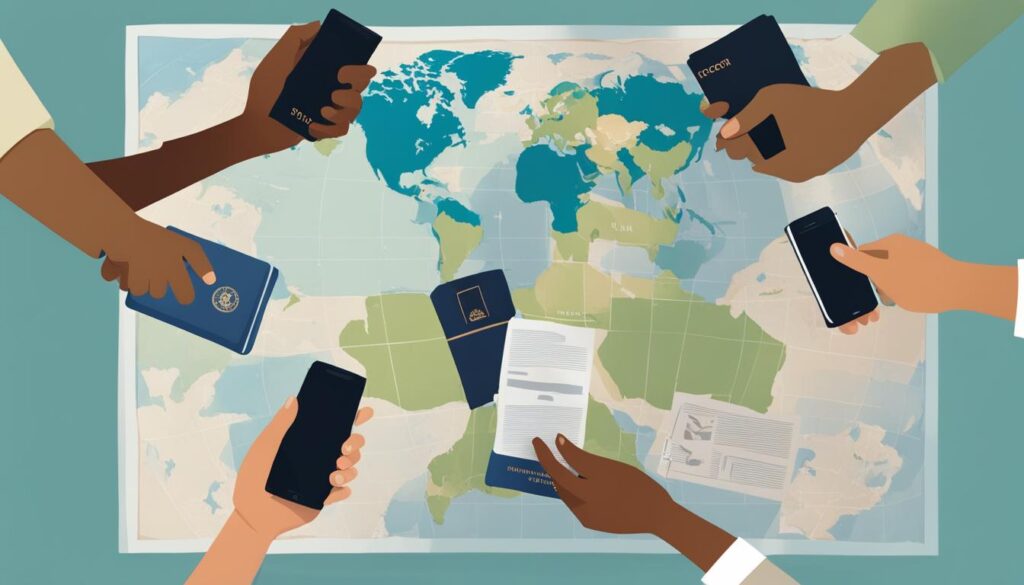Traveling to new and exciting destinations is an enriching experience, but it can also come with risks, such as facing harassment or unwanted attention. Whether you’re on a solo trip or traveling in a group, it’s crucial to prioritize your personal safety and take necessary precautions to avoid potential danger. In this section, we will provide you with essential tips and strategies for dealing with harassment while traveling.
Harassment can take many forms, such as verbal, physical, or sexual, and it can happen to anyone, regardless of their gender or nationality. It’s essential to understand what constitutes harassment and how to recognize it in different situations. Knowing how to handle harassment while traveling can ensure that you have a safe and enjoyable experience.
Continue reading for practical advice on how to prevent harassment while traveling, stay safe in the face of harassment, and seek support and resources if needed. By following these tips, you can travel with confidence, knowing you are prepared to handle any situation.
Understanding Different Forms of Harassment
As a traveler, it’s important to be aware of the different types of harassment that may occur while abroad. Three common forms of harassment are verbal, physical, and sexual.
Verbal harassment includes name-calling, insulting, or intimidating behavior. It can occur in various settings, from the street to public transportation, to restaurants and bars. Physical harassment involves unwanted touching, pushing, or shoving, and can escalate to physical assault.
Sexual harassment is another form of harassment that travelers may face. It covers a wide range of behaviors, from inappropriate touching to sexual assault. It often occurs during travel as the perpetrator may take advantage of the unfamiliar environment, local customs, or language barriers.
| Form of Harassment | Description |
|---|---|
| Verbal Harassment | Name-calling, insulting, or intimidating behavior |
| Physical Harassment | Unwanted touching, pushing, or shoving and physical assault |
| Sexual Harassment | Inappropriate touching to sexual assault |
Identifying and differentiating these forms of harassment is essential in taking prompt and appropriate action. If you find yourself in a situation where you feel unsafe or threatened, it’s important to protect yourself and seek help immediately.
Tips for Identifying Harassment
Here are some tips to help you identify potential harassment situations:
- Trust your instincts – If you feel uncomfortable or threatened in a situation, leave immediately.
- Pay attention to body language – Be aware of your body language and that of those around you. Avoid eye contact or engaging with anyone who appears threatening.
- Look out for red flags – Be wary of individuals who invade your personal space, block your path, or try to isolate you.
- Stay alert – Be mindful of your surroundings and any potential danger.
Being vigilant and aware of your surroundings can help you avoid dangerous situations and prevent harassment while traveling.
Tips for Preventing Harassment While Traveling
When traveling, it’s essential to take steps to protect yourself from harassment. By following these tips, you can reduce the risk of becoming a target for harassment:
- Choose safe and secure accommodations.
- Dress appropriately and avoid drawing unwanted attention to yourself.
- Maintain situational awareness by staying alert and observant of your surroundings.
- Establish boundaries and be assertive when necessary.
Additionally, consider carrying a self-defense tool, such as pepper spray or a personal alarm, to feel more secure. Remember, prevention is key, and taking proactive steps to safeguard yourself can help you avoid dangerous situations.
If you do experience harassment while traveling, don’t hesitate to report it to the authorities or seek help from fellow travelers. Remember that you are not alone, and resources are available to support you.
Staying Safe While Facing Harassment Abroad
As a traveler in a foreign country, you may face harassment and feel overwhelmed by the situation. It is crucial to know how to stay safe and handle these situations effectively.
De-escalation Techniques: If you feel threatened or unsafe, try to remain calm and use de-escalation techniques to defuse the situation. Avoid making eye contact or engaging with the harasser and move away from the situation to a safe location as quickly as possible.
Assertiveness: Use a clear and assertive tone to communicate your boundaries and make it clear that the behavior is unacceptable. Avoid getting defensive or engaging in an argument, and instead, focus on removing yourself from the situation.
Seek Help: If you feel unsafe or threatened, seek help from authorities or other travelers nearby. Identify the nearest police station or embassy and keep their contact details readily available.
Document Everything: Keep a record of the harassment incidents, including the date, time, location, and any witnesses. This information may be helpful when reporting the incident.
Remember, your safety should always be your top priority. Don’t hesitate to reach out for help and report any incidents of harassment to the authorities.
Reporting Harassment While on a Trip
If you experience harassment while traveling, it is important to report the incident as soon as possible. Reporting can help prevent similar incidents from happening to other travelers, and will also ensure that you receive the appropriate support and assistance.
- If you feel safe and comfortable doing so, try to verbally confront the person and clearly state that their behavior is unacceptable.
- Document the incident by writing down the date, time, location, and a description of what happened. It is also helpful to take photographs or video footage if possible.
- Report the harassment to the appropriate authorities in the area. This may include the local police, embassy or consulate, or a travel safety hotline. You can usually find contact information for these resources online or through your travel accommodations.
- Additionally, you may want to report the incident to your travel company or tourism board, as they may have additional resources or support available.
Remember that reporting harassment can be a difficult and emotional process. Seek out support from friends, family, or local organizations to help you through this difficult time.
Here are some organizations that can provide assistance and support:
“RAINN (Rape, Abuse & Incest National Network) is the largest anti-sexual violence organization in the United States. RAINN created and operates the National Sexual Assault Hotline (800.656.HOPE) in partnership with more than 1,000 local sexual assault service providers across the country and operates the DoD Safe Helpline for the Department of Defense. RAINN also carries out programs to prevent sexual violence, help survivors, and ensure that perpetrators are brought to justice.”
Cultural Sensitivity and Awareness
Being culturally sensitive and aware while traveling is essential to avoid causing offense or attracting unwanted attention. One of the best ways to prepare yourself is to research and understand local customs, norms, and laws. This can help prevent cultural misunderstandings that may lead to conflicts or harassment.
Here are some tips to help you develop cultural sensitivity and awareness:
- Read up on your destination: Learn as much as you can about the local culture, history, and current events. This can help you better understand the customs and values of the local people and avoid unintentionally offending them.
- Observe local behavior: Pay attention to how people dress, greet each other, and behave in public. This can give you valuable insights into the local etiquette and social norms.
- Learn some key phrases: Knowing a few basic phrases in the local language can help you connect with people and show respect for their culture. This can also help break down language barriers and make communication easier.
- Respect local customs and laws: Be mindful of local customs and laws when it comes to dress, behavior, and interactions with others. This includes respecting religious practices, dress codes, and social taboos.
Remember, cultural sensitivity and awareness are essential for safe and enjoyable travel experiences. By taking the time to learn about local customs and values, you can help ensure that you are respectful and mindful of the cultures you are visiting.
Utilizing Technology for Safety
Traveling is an incredible experience, but it’s important to prioritize your safety while exploring new places. Technology can be a useful tool for enhancing your safety and security while traveling. Here are some safety tips for dealing with harassment while traveling and utilizing technology:
1. Download safety apps: There are several safety apps available that can help you stay safe while on your travels. Apps such as “Companion” allow your contacts to track your journey and receive alerts if anything goes wrong. Other apps like “bSafe” and “SOS Stay Safe” have emergency buttons that can alert the police, your chosen contacts, or emergency services to your location.
2. Use GPS trackers: GPS tracking devices can be useful for keeping you safe while you explore new places. Devices like the “Spot Gen3” and “Garmin inReach” allow you to send your location to your loved ones and emergency services in case of an emergency.
3. Set up emergency contact features on your smartphone: You can set up emergency contact features on your smartphone so that your chosen contacts can be alerted in case of an emergency. iPhones, for example, have an “Emergency SOS” feature that allows you to quickly call for help and alerts your emergency contacts with your current location.
4. Stay connected: It’s always a good idea to stay connected with your friends and family while you’re traveling. You can use social media apps like Instagram and Facebook to check in and let your loved ones know where you are and what you’re doing.
5. Keep your devices charged: Make sure to keep your devices charged while traveling, so you always have access to your safety apps and emergency contact features.
By following these tips and utilizing technology, you can enhance your personal safety and ensure a safe and enjoyable travel experience. Remember, it’s important to prioritize your safety while traveling, and technology can help you do just that.
Seeking Support and Resources
Dealing with harassment while traveling can be a challenging and emotional experience. It’s important to know that you don’t have to go through it alone. There are many resources available to offer guidance, support, and a safe space to share your experiences.
If you have experienced harassment while traveling, consider reaching out to one of the many organizations that specialize in handling these types of situations. Groups like RAINN (Rape, Abuse & Incest National Network) or the Sexual Assault Support and Help for Americans Abroad Program provide confidential support and advocacy for survivors of sexual violence.
If you’re in immediate danger or need urgent assistance, don’t hesitate to contact local law enforcement or emergency services. Keep important phone numbers and addresses handy, such as the nearest embassy or consulate, and familiarize yourself with local emergency protocols.
Online Resources
There are also numerous online resources available for travelers dealing with harassment. Platforms like Traveller Assist or The Solo Female Traveler Network offer support and advice specifically tailored to the needs of travelers.
Online forums and message boards can also be a helpful way to connect with other travelers who have experienced similar situations. Just remember to exercise caution when sharing personal information online and to only engage with reputable sources.
Hotlines and Support Resources
| Organization | Phone Number | Website |
|---|---|---|
| RAINN (Rape, Abuse & Incest National Network) | 1-800-656-4673 | https://www.rainn.org/ |
| Sexual Assault Support and Help for Americans Abroad Program | +1-202-501-4444 (24hrs) | https://travel.state.gov/content/travel/en/international-travel/emergencies/sexual-assault-help.html |
Conclusion
Dealing with harassment while traveling can be stressful and overwhelming, but it is essential to prioritize your safety and well-being. Remember to stay aware of your surroundings, establish boundaries, and seek help if needed. By utilizing the strategies and resources provided in this article, you can minimize the risk of encountering harassment and enjoy a safe and enjoyable travel experience.
Always keep in mind that cultural sensitivity and awareness are crucial in avoiding unwanted attention, and technology can be a helpful tool in enhancing personal safety. If you do experience harassment while on your trip, don’t hesitate to report the incident and seek support from organizations and online communities that can offer guidance and assistance.
Stay vigilant, stay safe, and have a memorable trip!
Keywords: dealing with harassment while traveling

















































